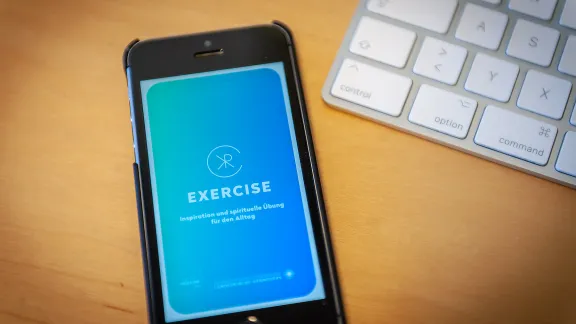
An app developed by the Evangelical Lutheran Church of Hanover strives to interrupt busy daily routines with spiritual impulses. Photo: LWF/S. Gallay
“Sabbath year” in the Evangelical Lutheran Church of Hanover
(LWI) – In Germany, the Evangelical Lutheran Church of Hanover is using modern means to draw attention to spirituality in people’s busy lives. An app called XRCS (“EXERCISE”) offers spiritual input to interrupt its users’ daily routines and combat every-day stress. The design of the new app is modern and minimalistic.
“The icon of the app XRCS is a modern interpretation of the millennia-old symbol of Christ. The letter combination of X and R – the first two letters of the Greek word ‘Christ’ – is surrounded by an open circle. It means that God lives in the midst of us,” explains deacon Rainer Koch, who developed the app.
The Hanover church, one of the 11 German member churches of the Lutheran World Federation (LWF), is offering the app as part of its “Time for free spaces in 2019” (Zeit für Freiräume 2019) initiative. The possibilities to interrupt busy daily routines include listening to the bells ringing at noon on the Hanover church website.
An old sabbath tradition in new garb
The project takes up the Old Testament tradition of sabbath rest: “Six days you shall work, but on the seventh day you shall rest; even in plowing time and in harvest time you shall rest” (Ex 34:21). The purpose of this weekly day of rest is to interrupt the rhythm of life as “the sabbath was made for humankind” (Mark 2:23-28).
Let us use the year 2019 to concentrate on the essential. I regard this as a spiritual challenge for us. This year we are looking attentively and critically at our activities as a Protestant church.
Hanover Bishop Ralf Meister invites both individuals and groups at different church levels to take part in the initiative: “I believe that more time and space would benefit us, our congregations and our church. Let us use the year 2019 to concentrate on the essential. I regard this as a spiritual challenge for us. This year we are looking attentively and critically at our activities as a Protestant church.”
There are many suggestions and resource ideas on the project website. For example, a 2:1 rule for the parish: when a new project is started, two existing events or groups are dropped. 2019 could be a trial year, but perhaps this could become a long-term approach? Or a new worship format like an “afterwork church” for professionals, between 5 and 7pm: between work and household chores, between desk and sofa, between hectic activity and idleness. A good hour with good conversation, a short meditation, an interesting speaker, light refreshments. For individuals a “Not to do list” opens new prospects: what do we NOT want to do in 2019? What do we want to do differently?
“We invited people to share their ideas and experiences with us,” says Rev. Dr Karoline Läger-Reinbold, who coordinates the “Time for free spaces in 2019” project. “After initial skepticism there was a lot of curiosity and great interest in trying to get out of a rut, experimenting with out new things or just dropping something in order to make a fresh start or reflect on the job in hand.”
LWF call to “rethink Sunday”
At the Twelfth LWF Assembly in 2017 in Windhoek, Namibia, delegates also grappled with the challenges of the 21st century for the churches in a secular world. In the Resolution on Strategic Priorities and Church Revival the assembly expressed the core concern of churches to be “faithful stewards of the gospel in times of change.” The Assembly called upon the Council to create “platforms for contextual deliberations, learning and exchange” between member churches. Another resolution is a call to “rethink Sunday,” stating: “Sunday offers the possibility to reinvigorate and maintain one’s balance in a world which is becoming more demanding.”
The XRCS app could be a small step in this direction. It offers users two ways of focusing afresh on God’s presence in daily life. The “exercises” mode takes up a centuries-old monastic tradition and is based on regular times of rest and reflection throughout the day.
The “inspiration” mode, on the others hand, surprises the user with spiritual questions at irregular intervals. It causes “salutary interruptions“, once, twice or three times a day, as desired.


